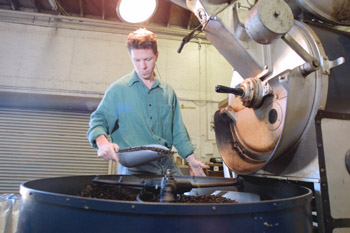![[Metroactive Dining]](/gifs/dining468.gif)
[ Dining Index | North Bay | Metroactive Central | Archives ]
Something brewing: Occidental coffee and tea maker Mark Inman is at the forefront of the fair-trade movement.
The Coffee King
Taylor Maid Coffee's co-founder stirs it up in the java jungle
By Paula Harris
MARK INMAN downs between 10 and 20 steaming hot cups of joe each day, mainly potent espressos and deeply fragranced brewed coffees--an alarming amount, even by his own admission. But he wouldn't have it any other way. "I've been a coffee person for 15 years. It's more than a job for me," says the feisty 33-year-old co-founder and roastmaster for the Occidental-based "green" company Taylor Maid Coffee. "Basically my entire life is surrounded by it."
He's not kidding. Inman no doubt needs all that caffeine-caressed elixir as aromatic gasoline to get him though his punishing 12-hour workday schedule, a daily grind that typically runs from 8 a.m. to 8 p.m.
Inman, who's known in the field as a coffee connoisseur, the equivalent of a "nose" in the perfume industry, kick-starts his mornings by roasting and sampling coffees from different farms, with a view not only to purchasing them himself, but to give feedback to other groups that send him their blends. Midday is the time for board meetings and phone conferences, and afternoons are normally tied up with training sessions, with writing for two trade magazines, and with daily operations.
"My mind is always buzzing around with new ideas, new concepts, and possibilities about where the coffee industry can go," gushes Inman, not batting an eye when using the term buzzing. "I usually overcommit myself to a lot of outside extracurricular things just because I'm interested in what the possibilities are."
Indeed, the energetic Inman (who races mountain bikes and runs in his limited spare time) last month completed a trip to Peru, where he was one of three American judges selected to drain java in a quest to find the 20 best coffees in that South American nation. Those farmers selected will now reap 10 times their normal earnings.
It's all in keeping with Taylor Maid's overall philosophy to positively affect the lives and communities of coffee growers around the world who no longer depend on agrochemicals.
The 10-year old company started life as an herb farm in Occidental. At the time, Inman, a roaster for 10 years in the mainstream coffee biz, became dismayed by the profit-grabbing practices he encountered. So he and his business partner Chris Martin, 47, started the Taylor Maid coffee line, the first 100 percent organic coffee line in Northern California. More recently another partner, Julie Baron, 37, joined the company to develop a line of organic teas.
"My goal is to create a company where the bottom line is not always about profit, but to create a greater mission," explains Inman, who also helped start the Organic Coffee Association, a national group that promotes organic coffees globally.
TAYLOR MAID is a pioneer in the green-business movement: recycling waste on-site; using biodegradable or recyclable packaging; promoting other green companies and organic farming groups; and using only shade-grown crops (to protect the ever-decreasing numbers of migratory birds).
In addition, the company is trying to break the chain of poverty for growers in other countries, using the fair-trade coffee system to ensure farmers a living wage.
"I have commitments to farmers in 16 different countries that I will find them a place to sell their products in the United States," says Inman. "We're working to help develop and increase economic and educational standards in those countries."
Inman says many consumers don't consider coffee an agricultural product, requiring backbreaking work. "The idea of Juan Valdez in a sense is true," he explains, "that a human being picks that coffee and processes it from start to finish. You can compare coffee with wine--and yes, wine may be handpicked, but it's not hand-processed all the way through; with coffee it's amazingly labor intensive."
Inman adds that the quintessential cup of joe yields qualities as complex as some of the finest cabernets in the world. "The perfect cup of coffee would be a single-country-origin coffee," he says, touting a recent discovery--a Nicaraguan organic coffee called Miraflor--in wine-snob terms. "This one has got nice rounded acidity--almost tannic in acid structure--a very floral and bright note to the top end of the coffee, and a rich velvety body. If you French-press or really prepare these coffees properly, not just use a filter brewer, and really let these coffees sit in your mouth and think about them, they have much more complexity than wine. There are so many flavors going on."
One of the biggest detriments to well-crafted coffee is overroasting, according to Inman. "In California, people drink coffees that are roasted way too dark," he scolds. "If you were to give a lighter roast coffee a try and brew it strong, you'd find that you'd have no reason to put sugar or cream in that coffee. You'd pick up a lot more sweetness and a lot more complexity. . . ."
Inman's voice trails off excitedly. He's already planning his next pot of joe.
[ North Bay | Metroactive Central | Archives ]
Copyright © Metro Publishing Inc. Maintained by Boulevards New Media.
![]()

Photograph by Michael Amsler
From the September 20-26, 2001 issue of the Northern California Bohemian.